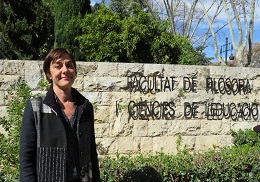
Vanessa Vidal has received the 2017-2018 PhD award for her thesis “Theodor Wiesengrund-Adorno: historical and natural interpretation”. The work has been led by researchers from the Department of Philosophy of the University of Valencia Sergio Sevilla Segura and Julián Marrades Millet. The thesis addresses the problems of the interpretation of art and its relation to knowledge and society from philosophers such as Hegel, Lukács, Benjamin or Adorno.
Vanessa Vidal graduated in Philosophy from the University of Valencia in 1999. Five years later, in 2004, she obtained the Diploma in Advanced Studies in Philosophy with the grade “A”. Two years later she emigrated to Germany to continue her doctorate studies, to learn the German language she needed for research, and also because she did not know very well what her working future in Spain was.
In August 2007 she moved to Berlin, where she began her doctoral thesis at the Walter Benjamin-Theodor Adorno Archive, and where she has been researching for 10 years. She defended her thesis in February 2016 and will receive the Summa Cum Laude grade and the international mention.
In September 2017 she returned to the University of Valencia after obtaining a position of tenure-track 1 lecturer in the area of Aesthetics and Theory of Arts in the Faculty of Education Sciences.
What difficulties have you encountered?
In my case, the difficulties have been, above all, economic. I have never doubted my decision to write a doctoral thesis and continue research, but the vital, personal and contextual circumstances that accompanied the writing of my work were not easy. It is also true that learning the German language I needed for research took me a long time. But I think that the greatest difficulty was to subsist financially while keeping the excitement and the strength to continue with it.
What continuity does this work have?
Fortunately, my research, thanks to my present situation as a tenure-track 1 lecturer, has a clear continuity in the academic field. The results of my research and training as a researcher, as well as my experience as a teacher in secondary education in Berlin, I believe that have been very helpful in being reinstated to my University. My present position is, perhaps, privileged compared to that of other doctorate colleagues, since it allows me to continue both in the research and dissemination of knowledge, and in the training of students, both inseparable from my own training as a teacher.
What do you think your research contributes to the scientific community as a whole and to society? And to you?
My research addressed the problems of the interpretation of art and its relationship with knowledge and society from philosophers such as Hegel, Lukács, Benjamin or Adorno. That is, the discipline in which I have worked is the aesthetic that, in today’s society, it is not considered a scientific discipline. However, or precisely because of that, I think that reflecting on the role of art in contemporary society is a central and very current theme that can help us clarify many things about our historical moment.
What applicability can your work have?
Connecting with the previous question, the philosophy of art does not have an immediate applicability as other sciences or engineering may have. My work focuses on a philosophical reflection on the problem of art and its interpretation, which apparently does not have an immediate effect. However, I believe that it allows us to access the artistic manifestations of the world of culture and relate them to the historical and social reality, as well as to criticise the pseudoartistic products of the dominant ideology.
Does getting a Doctorate facilitate employability?
In my particular case and due to the special circumstances that occurred, the doctorate was the key to obtaining the tenure-track 1 lecturer position at the University, since it is a requirement to participate in the call. In Germany, for example, the title of Doctor does greatly facilitate employability and has a great social recognition. I think the same thing is not happening in Spain, unfortunately. Especially if the doctorate is in Philosophy.
Would you recommend starting doctoral studies? What advice would you give to a person who wants to get a PhD?
Yes, without a doubt. Of course it would encourage anyone who has an interest in taking their doctoral studies. I think that this is a very important and special training, which not only forms as a researcher but also as a person. Now, I think that there is much passion and perseverance, skills that are also learned and strengthened during this time.
Have you actively participated in outreach activities and scientific communication? How important do you think these activities are?
I have participated actively in numerous international scientific conferences, both in Spanish universities and in German universities and research centres. My experience in all these events has been very positive and enriching. I have learned a lot from classmates and colleagues, and I have always heard that the rest of the participants involved have taken my lectures very seriously and have always provided me with comments, as well as critics, very constructive, which have helped me to improve my research Participating in these activities is essential to know the work of my colleagues and present ours.

.jpg)








